

As the saying goes, there’s a sucker born every minute. Wherever large amounts of people congregate, hoaxers and scammers will always turn up, looking for a mark. You can bet an entire year’s salary that at least a few people will fall for them and their silver tongued empty promises. And Facebook is an ideal target-rich environment for them to ply their trade.
It was not that long ago that I was fooled by the story circulating on Facebook that the TV series Breaking Bad was returning. I shared it like a panting fanboy then discovered I had been had. That was a pretty bad blow to the ego, getting caught out by that.

Below are some of the most common hoaxes found on Facebook, as well as tips on how to avoid sharing them with your Facebook chums.
Here are some of the better known ones, in no particular order.
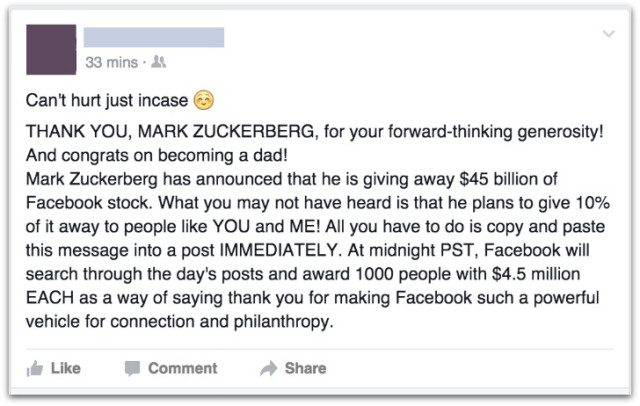
This is the Facebook myth that just refuses to die. First it was Bill Gates giving away money to random naive Facebookers. Now it’s Mark Zuckerberg throwing away his not-so-hard earned millions at total strangers.
What do you have to do to earn these amazing millions? As the screenshot says, just copy and paste the the message into your News Feed, and eventually Facebook staff (who have nothing better to do with their time) will search through Facebook and select 1,000 people who fell for it, hook line and sinker.
Now, notice the message, pictured above, started with “Can’t hurt just in case”? Seems logical right? You have to be in it to win it. What’s the worst that could happen? Well, apart from spreading spam around, you are also promoting crap, and when people subsequently start ignoring legitimate status messages as a result, the genuine important messages will be overlooked. Such as the Mark O’Neill Foundation asking for donations to help a “M O’Neill” stop work for a life of indolence and decadence. Don’t miss that one.
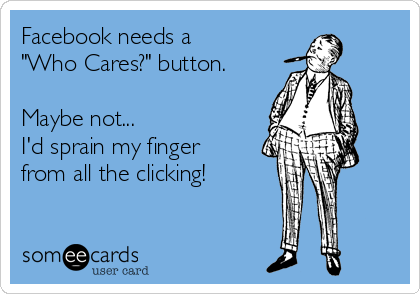
There are times when someone posts something sad or generally negative, and suddenly clicking “like” seems really inappropriate. Such as death, divorce, losing your job, or finding out that your daughter has outed herself as a Justin Bieber fan. These kinds of updates need more of a middle finger button. Or a thumbs-down “Dislike” button maybe?

This scam has been circulating for ages, and gets a new lease of life whenever Facebook starts talking about maybe bringing in a proper Dislike button. So in a way, Facebook are the ones unintentionally keeping this hoax going, by refusing to definitively put this issue to bed once and for all.
When you get this scam on your Wall, you will be asked to click on a link to install the button. However, you are taken to a fake Facebook page where you will be asked to like and share the bogus status update. This ensures the scam’s continued life as it is now on the walls of your Facebook friends, who will themselves share it.
Will you get your button then? Of course not. There are seemingly two versions of the scam at this stage. One sends you to a page to “verify your profile”. You will be asked to take part in surveys and reveal your personal information. The scammers then profit from unethical affiliate marketing, and selling your personal information to data brokers.
The other version of the ruse is that you will be asked to click on a link to get your button, and instead you will get malware. Lovely, eh?
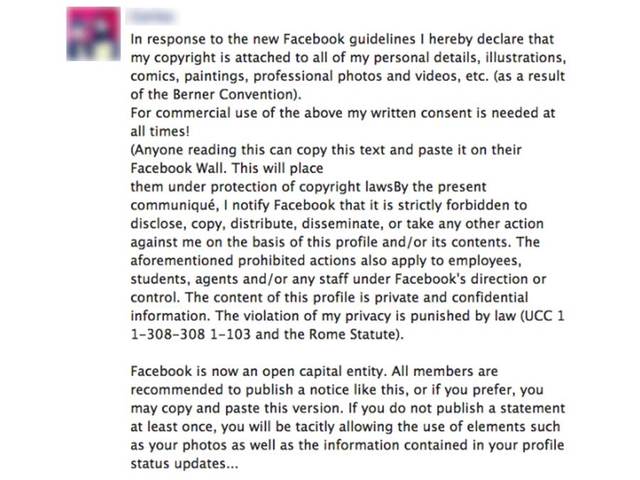
This one reminds me a lot of all the naive YouTubers, who post copyrighted material, such as a movie. They then say in the video description “No copyright violation intended. Copyright stays with <insert name of movie studio here>”.
In other words, they think copy/pasting text into the page will magically make it legal. And the people of this hoax think so too. The weird thing is that no-one is illegally making any profit from this. It is simply a nuisance, which spreads misinformation. Yet it continues to procreate.
The scam entices people to copy/paste a set text into their Newsfeed, and this is supposed to protect their privacy and copyright on everything they have posted – and will post in the future – to Facebook. After all, there is that strict law called “UCC 11-308-308 1-103″ which protects them. Every first year law student can recite THAT one from memory.
There is no such thing as the “Berner Convention” (maybe you’re thinking of the Berne Convention?). And the “Rome Statute” created the International Criminal Court. Somehow I don’t think Mark Zuckerberg is going to be extradited to the Hague to stand trial for commercially using pictures of your breakfast.
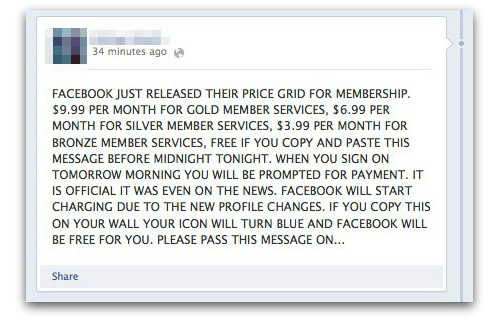
People are so used to getting everything for free on the Internet. So much so that print media is on its last legs and paywalls are as popular as a fart in a spacesuit. So when someone starts a teeny-weeny rumour on Facebook that the social network will soon start charging people to use the site, predictably the status update goes viral, and people started shrieking in indignation. Except obviously it isn’t true, and it wasn’t “on the news”. Unless you read the Onion and you can’t tell the difference between real and satire.
Gold member services! Sounds exclusive doesn’t it? But if you copy and paste the above message into your feed “before midnight tonight” (got to create that urgent feeling), then Facebook will be free for you! Your icon will even turn blue!
This lie has been doing the rounds for so long that Facebook finally addressed it in their Help Centre. But still this ridiculous notion rises like Lazarus.
I was alerted to this one by my wife who subscribes to a German Facebook page called “Think First, Click Later” (Zuerst Denken, Dann Klicken).
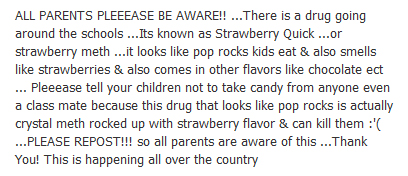
I had absolutely no idea what Pop Rocks were. So I went Googling.
Eventually I came across their website, which gave me the following explanation:
POP ROCKS® are small pieces of hard candy that have been gasified with carbon dioxide under super-atmospheric pressure. When these gasified sugar granules come in contact with moisture, in someone’s mouth or in a liquid, the gas retained inside the carbon dioxide bubbles is released, causing its characteristic popping sensation as well as crackling and fizzing sounds.
The Facebook scam (according to the screenshot above) claims that “Pop-Rocks”, which seemingly taste like strawberry or chocolate, is actually crystal meth in disguise. So if your kid eats it, they will die of a drug overdose.
The scam has its own Wikipedia page, and basically it comes down to the fact that it might occur, but to date, there have been no verified incidents. So the last line “happening all over the country” is a great big fib.

My wife again alerted me to this one. It seems that one of our friends was targeted with this, not that long ago.
The scam involves stealing someone’s profile picture, creating another Facebook profile with that picture, but changing the name by one letter (so it is not immediately noticeable). Once the profile has been created, everyone on the genuine person’s friends list is sent friend requests basically saying “I accidentally unfriended you, please friend me again”.
Once the scammers have your friends on board, they then send messages about all kinds of nonsense. This man was asked if he wanted to contact someone about obtaining a $50,000 federal grant. Or they outright ask for money, saying something along the lines of they really need a loan. Probably they will throw a few spam links your way. The fact that you think your friend sent them gives the messages instant credibility.
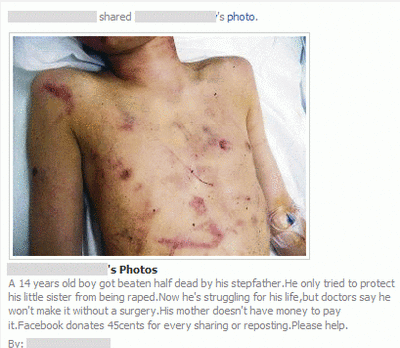
One of the biggest scams constantly doing the rounds on Facebook is the “sick kid” ruse. This could range from “he is dying from cancer. Send him a greeting card. It will make him happy” to the simple “x number of likes and shares will give this child surgery”. In other words, they aim to pull on the heart strings. After all, who is so inhumane that they would wish a child dead?
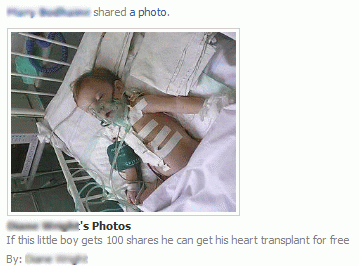
These scams are asking you to believe that a very busy understaffed hospital, and Facebook, are monitoring the number of likes and shares for these types of posts. Then when the child gets 100 shares, a surgeon shouts “HE’S GOT 100!! PREP HIM FOR SURGERY!!”.
Seriously? You actually believe this? Anyone who believes something like this should get a lifetime ban from using the Internet.
Now that you have a better idea of the kind of things floating around Facebook, let’s do a quick rundown on the things you can do to avoid them.
If someone who is not your Facebook friend visits your Facebook Wall, they will see your friends list on the left hand side. Seeing who your friends are will enable them to do the account impersonation scam. Blocking access to your friends list will stop that in its tracks. All you need to do is restrict the audience of the friends list to “friends only”.
To do this, go to your Facebook page, then to the box which shows your friends. In the top right hand corner of the box is a drop down box. Choose “Edit privacy”

This will open up a big white box. You need to look at the first option :
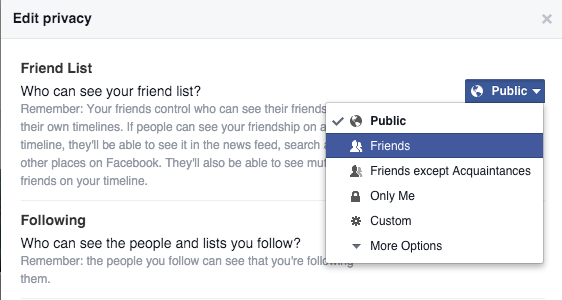
Change that from Public to Friends. You may also want to change the second option to “Friends” too.

The moment you will experience big privacy problems with Facebook is when you accept every single friend request, and you open the door to every crazie out there. I can never understand people with 2,000 Facebook friends. Nobody has that many friends, so most of those people will probably be complete garden variety lunatics, who will be two sandwiches short of a picnic. And they have access to your friends list. And your private information. Sleep well.
The solution here is simple. Restrict access to your account to only people you have met, people you know and trust, and people who have been recommended by someone you know and trust. Everyone else gets ignored.

A favourite online meme of mine is one which says :
“Don’t immediately believe every quote you read on the Internet” – Abraham Lincoln
For me, that sums up the attitude you should always adopt when reading anything online. Never automatically assume anything is instantly true. Assume it is false (or at the very least exaggerated), and start checking for other sources to either prove or disprove the story.
The best place to go for this is Snopes, a site which specializes in debunking all Internet myths. Similar sites include Truth or Fiction, FactCheck, and HoaxSlayer.

Further to what I’ve already said about the account impersonation scam, if you receive a friend request from someone whom you’re already friends with, don’t click the button. Instead, examine the account closely for any irregularities. Then call your friend up, and either report the fake account, or check with them to see if it was really them who sent the request. If not, report the fake account to Facebook right away.

Friends don’t let other friends fall for scams. If you see that they are sharing any, and quite possibly falling for any, then do your friend duty and step in. Send them the appropriate link from Snopes, or the link of this page. Hell, send them both!
Make sure they block and report the post to Facebook, and that they warn their Facebook friends of the scammy post that they have spread. Trust me, they will thank you later.
There are other scams out there that I felt were not as important as the ones I listed above. But maybe you feel that I gave one more priority than it deserved? If so, point out which one is not that serious, and what should take its place. Have you ever fallen for any of these scams?
Image Credits: hacker with laptop by GlebStock via Shutterstock, JaysonPhotography / Shutterstock.com. Other images provided attribution-free from PixaBay




 Connect Netflix to PS3 with Verizon
Connect Netflix to PS3 with Verizon Fallout 4: Quartermastery walkthrough
Fallout 4: Quartermastery walkthrough Halo 4 Armor Unlocks Guide: Armor Sets, Visors, Stances
Halo 4 Armor Unlocks Guide: Armor Sets, Visors, Stances 10 Best New Wii U Games Of 2015
10 Best New Wii U Games Of 2015 Fallout 4: Ad Victoriam walkthrough
Fallout 4: Ad Victoriam walkthrough